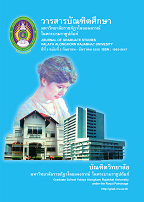ยุทธศาสตร์การบริหารงบประมาณขององค์กรปกครองส่วนท้องถิ่นด้านการจัดการน้ำตามหลักปรัชญาเศรษฐกิจพอเพียง
Main Article Content
บทคัดย่อ
การวิจัยครั้งนี้มีจุดมุ่งหมายเพื่อ 1) ศึกษาความต้องการจำเป็นและวิธีการแก้ปัญหา อุปสรรคในการบริหารงบประมาณขององค์กรปกครองส่วนท้องถิ่นด้านการจัดการน้ำตามหลักปรัชญาเศรษฐกิจพอเพียง 2) ศึกษาองค์ประกอบเชิงยืนยันของปัจจัยที่มีความสัมพันธ์กับทิศทางการกำหนดยุทธศาสตร์ในการจัดการน้ำตามหลักปรัชญาเศรษฐกิจพอเพียง 3) เสนอแนะแนวทางพัฒนายุทธศาสตร์ใหม่ในการจัดการน้ำตามหลักปรัชญาเศรษฐกิจพอเพียง โดยใช้ระเบียบวิธีวิทยาคิว (Q Methodology) เป็นการวิจัยแบบผสานวิธีทั้งเชิงปริมาณและเชิงคุณภาพ การวิจัยเชิงปริมาณดำเนินการโดยเก็บข้อมูลกับกลุ่มตัวอย่าง จำนวน 750 คน ที่เลือกแบบโควตาจากกลุ่มประชากร ประกอบด้วย ผู้บริหารองค์การบริหารส่วนตำบล จำนวน 45 คน สมาชิกสภาองค์การบริหารส่วนตำบล จำนวน 45 คน ผู้นำท้องที่ในพื้นที่องค์การบริหารส่วนตำบล จำนวน 15 คน ประชาชนในเขตพื้นที่การวิจัย จำนวน 510 คน ครู บุคลากรทางการศึกษา ผู้บริหารโรงเรียนในเขตองค์การบริหารส่วนตำบล จำนวน 90 คน และพระภิกษุสงฆ์ จำนวน 45 รูป ในพื้นที่องค์การบริหารส่วนตำบลขนาดใหญ่ ขนาดกลาง ขนาดเล็ก วิเคราะห์ข้อมูลโดยโปรแกรมทางสถิติ ซึ่งพิจารณาค่าไคสแควร์ (Chi-Square) และค่ารากที่สองของค่าเฉลี่ยความคลาดเคลื่อนกำลังสองการประมาณค่า RMSEA (Root Mean Square Error of Approximation) ส่วนการวิจัยเชิงคุณภาพ ดำเนินการโดยสัมภาษณ์กลุ่มแบบเจาะลึก (In-Depth Interview Group) ผู้ให้ข้อมูลสำคัญ จำนวน 55 คน ที่เลือกแบบเจาะจงจากกลุ่มครู บุคลากรทางการศึกษา ผู้บริหารโรงเรียน พนักงานส่วนตำบล ผู้นำท้องที่ พระภิกษุสงฆ์ โต๊ะอิหม่ามในเขตพื้นที่องค์การบริหารส่วนตำบล การวิเคราะห์ข้อมูลโดยวิเคราะห์เชิงเนื้อหา ประกอบด้วย การตีความและวิเคราะห์ความ จากข้อค้นพบ และนำไปใช้ในการเสนอแนะเชิงนโยบาย
ผลการวิจัยพบว่า
1. ปัจจัยด้านงบประมาณแหล่งน้ำ ปัจจัยด้านบทบาทของประชาชน ปัจจัยด้านความสำคัญของน้ำ ปัจจัยด้านสภาพทางเศรษฐกิจ และปัจจัยด้านสภาพสังคมตามแนวคิดเศรษฐกิจพอเพียงมีความสัมพันธ์ต่อความต้องการจำเป็นของตัวแปรด้านปรัชญาเศรษฐกิจพอเพียงเชิงบวกและมีอิทธิพลต่อยุทธศาสตร์การบริหารงบประมาณขององค์กรปกครองท้องถิ่นด้านการจัดการน้ำเพื่อการอุปโภค บริโภค และการเกษตรตามหลักปรัชญาเศรษฐกิจพอเพียง ปัจจัยงบประมาณแหล่งน้ำมีอิทธิพลทางตรงต่อบทบาทของประชาชน ความสำคัญของน้ำและสภาพเศรษฐกิจไม่มีอิทธิพลต่อสภาพสังคมตามแนวคิดเศรษฐกิจพอเพียง ในขณะที่ปัจจัยทางสภาพทางสังคมได้รับอิทธิพลทางตรงจากงบประมาณแหล่งน้ำ แต่ไม่มีความสัมพันธ์กับบทบาทของประชาชน สภาพเศรษฐกิจของชุมชนและความสำคัญของแหล่งน้ำ ส่วนความต้องการจำเป็นด้านวิธีการแก้ปัญหาและอุปสรรคขององค์กรปกครองส่วนท้องถิ่น ประกอบด้วย 1) ประโยชน์ที่ประชาชนได้รับในการจัดสรรงบประมาณ เรื่องน้ำเพื่อการอุปโภค บริโภค และการเกษตร 2) อนุรักษ์และฟื้นฟูทรัพยากรธรรมชาติทั้งป่าไม้ ดิน และน้ำที่มีความสำคัญต่อความเป็นอยู่ของชุมชน และ3) ประชาชนมีส่วนร่วมในการประเมินผลการใช้น้ำและพัฒนาแหล่งน้ำอย่างยั่งยืน
2. องค์ประกอบเชิงยืนยันของปัจจัยที่มีความสัมพันธ์กับทิศทางการกำหนดยุทธศาสตร์ในการตระเตรียมน้ำเพื่อการอุปโภค บริโภค และการเกษตร ตามหลักปรัชญาเศรษฐกิจพอเพียง ประกอบด้วย ปัจจัยด้านงบประมาณแหล่งน้ำ ปัจจัยด้านบทบาทของประชาชน ปัจจัยด้านความสำคัญของน้ำ ปัจจัยสภาพทางเศรษฐกิจ และปัจจัยด้านสภาพสังคมตามแนวคิดเศรษฐกิจพอเพียง โดยโมเดลเชิงโครงสร้างภาพรวมของยุทธศาสตร์ การบริหารงบประมาณขององค์กรปกครองส่วนท้องถิ่น ตัวแปรปัจจัยปรัชญาเศรษฐกิจพอเพียงมีอิทธิพลทางตรงกับปัจจัยด้านงบประมาณขององค์การบริหารส่วนตำบล และปัจจัยด้านความสำคัญของน้ำ ส่วนบทบาทของประชาชนได้รับอิทธิพลทางอ้อมโดยส่งผ่านปัจจัยด้านงบประมาณขององค์การบริหารส่วนตำบล ส่วนปัจจัยทางเศรษฐกิจได้รับอิทธิพลทางอ้อมโดยผ่านปัจจัยด้านงบประมาณขององค์การบริหารส่วนตำบล จากโมเดล การวิจัยสอดคล้องกับข้อมูลเชิงประจักษ์ในระดับดีมาก โดยได้ ค่าไคสแควร์ เท่ากับ 66.70 ค่าระดับนัยสำคัญ (p) เท่ากับ 0.589 ค่าชั้นของความเป็นอิสระ (df) เท่ากับ 70 และค่ารากที่สองของค่าเฉลี่ยความคลาดเคลื่อนกำลังสอง (RMSEA) เท่ากับ 0.000
3. ข้อเสนอแนะในการจัดทำยุทธศาสตร์การบริหารงบประมาณขององค์กรปกครองส่วนท้องถิ่นด้านการจัดการน้ำ ตามหลักปรัชญาเศรษฐกิจพอเพียง โดยเน้นการบริหารการบูรณาการด้านการบริหารงบประมาณ รวมทั้งการพัฒนาแหล่งน้ำให้เกิดความสมดุล นำไปสู่การแก้ไขปัญหาเรื่องน้ำอย่างยั่งยืน อยู่บนยุทธศาสตร์หลัก 4 ด้าน ได้แก่ ยุทธศาสตร์ที่ 1 การบริหารงบประมาณขององค์กรปกครองส่วนท้องถิ่น ด้านการจัดการน้ำอย่างมีประสิทธิภาพ ยุทธศาสตร์ที่ 2 การบริหารจัดการแก้ไขปัญหาด้านน้ำเพื่ออุปโภคบริโภค และการเกษตรอย่างยั่งยืน ยุทธศาสตร์ที่ 3 การบูรณาการจัดการด้านน้ำโดยทุกภาคส่วนในสังคมทั้งภาครัฐ เอกชน ชุมชนและประชาชนมีส่วนร่วมในการแก้ไขปัญหาการขาดแคลนน้ำร่วมกันอย่างเป็นรูปธรรม และยุทธศาสตร์ที่ 4 การสร้างจิตสำนึกในการแก้ไขปัญหาการขาดแคลนน้ำอย่างมีส่วนร่วม
The purposes of this research were: 1) to study the need assessment, problems and obstacles of the budgeting management strategy of the Local Administrative Organizations on water management for consumption and agriculture based on Sufficiency Economy Philosophy 2) to study the confirmatory factor analysis (CFA) on the major factors correlated with the direction and the budgeting management strategy and 3) to propose the new strategies for development of the local governments to prepare the water consumption and agriculture based on Sufficiency Economy Philosophy by using Q-methodology which was the combination of quantitative research and qualitative research. The quantitative approach was conducted by collecting data from the samples of 750 respondents comprising 45 executives of SAO, 45 members of SAO council, 15 local leaders in SAO, 510 people living in the area of study, 90 teachers, educational personnel commissions and school administrators in Subdistrict Administrative Organizations and 45 Buddhist monks. The scope of the area study was divided into large, medium and small size of SAO. Data were analyzed by statistic program. The developed structure model was congruent with empirical data as criterion as follows: Chi-Square and RMSEA (Root Mean Square Error of Approximation). Data on the qualitative research were collected by in-depth interview from 55 key informants selected purposively consisting of teachers, educational personnel commissions, school administrators, local leaders, Buddhist monks and Imams. Data were analyzed by content analysis and interpretation.
The research findings were as follows:
1. The budgeting management for water resources, the role of people, the importance of water, the economic status and the social conditions based on the Sufficiency Economy Philosophy were all positively correlated with the need assessment on the Sufficiency Economy Philosophy and also had directly the effect on the budgeting management strategy of the Local Administrative Organizations on water management for consumption and agriculture. The budgeting management for water resources directly affected the role of people; the importance of water and the economic status was not directly correlated with the social conditions. However the social status was correlated with the budgeting management, but was not correlated with people role, the importance of water and the economic status in the community. The necessary condition for solution of problems and obstacles in Local Administrative Organizations composed of 1) the benefits that had been allocated in the budgeting management for water consumption and agriculture 2) conservation and restoration of natural resources, including forests, soil, and water that were vital to the community well being and 3) people participation in the evaluation of the use and development of sustainable water resources.
2. The confirmative factor components correlated with the direction of budgeting management strategy of the Local Administrative Organizations for consumption and agriculture based on the Sufficiency Economy Philosophy were composed of the budgeting management for water resources, the role of people, the importance of water, the economic status and the social conditions. The structural equation model of the total budgeting management strategy showed that the Sufficiency Economy Philosophy factor directly affected the budgeting management for water resources and the importance of water. But the role of people had indirect effect by mean of the budgeting management of the Local Administrative Organizations. The developed model in this research was good fitted to empirical data which showed that Chi-Square = 66.70, df = 66.70, p-value = 0.58961, RMSEA = 0.000.
3. The guidelines for development of the budgeting management strategy planning of the Local Administrative Organizations on water management for consumption and agriculture based on the Sufficiency Economy Philosophy consisted of integrating the management and development the water resources to achieve balance of sustainable water solutions based on the four main principal strategies described as follows: the first strategy, an efficient budgeting management of the Local Administrative Organizations on water management, the second strategy a sustainable management and guidelines to the solution of water consumption and agriculture, the third strategy, integrating water shortage management by all section in concrete participatory action; governmental section, private sections and people, and the fourth strategy, public awareness creation in solving the inefficient water for consumption and agriculture.
Article Details

อนุญาตภายใต้เงื่อนไข Creative Commons Attribution-NonCommercial-NoDerivatives 4.0 International License.
บทความทุกเรื่องได้รับการตรวจความถูกต้องทางวิชาการโดยผู้ทรงคุณวุฒิ ทรรศนะและข้อคิดเห็นในบทความ Journal of Global of Perspectives in Humanities and Social Sciences (J-GPHSS) มิใช่เป็นทรรศนะและความคิดของผู้จัดทำจึงมิใช่ความรับผิดชอบของบัณฑิตวิทยาลัย มหาวิทยาลัยราชภัฏวไลยอลงกรณ์ ในพระบรมราชูปถัมภ์ กองบรรณาธิการไม่สงวนสิทธิ์การคัดลอก แต่ให้อ้างอิงแหล่งที่มา


